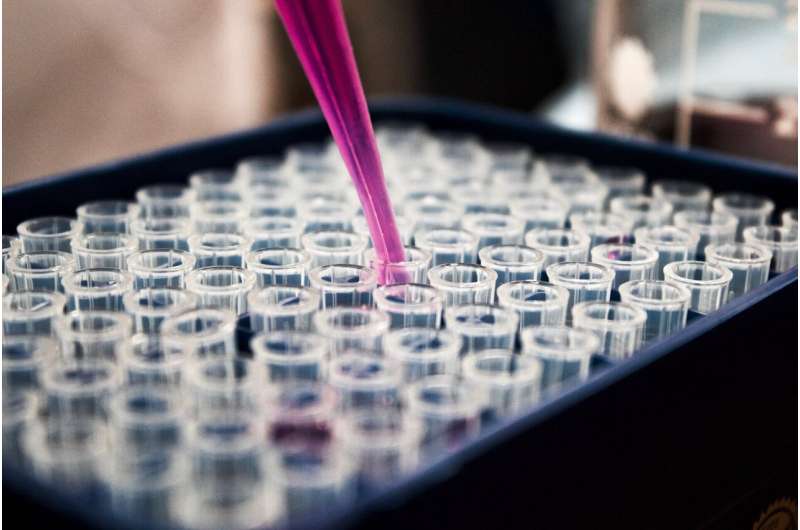This article has been reviewed according to Science X's editorial process and policies. Editors have highlighted the following attributes while ensuring the content's credibility:
fact-checked
peer-reviewed publication
trusted source
proofread
Clinical trial finds dendritic cell vaccine safe, induced immune responses in patients with multiple myeloma

A dendritic cell vaccine administered before and after autologous stem cell transplant (ASCT) was safe and immunogenic and was associated with durable clinical responses in patients with high-risk multiple myeloma, according to research published in Clinical Cancer Research.
"Multiple myeloma is a chronic and incurable cancer," said Frederick L. Locke, MD, chair of the Blood and Marrow Transplant and Cellular Immunotherapy Department at Moffitt Cancer Center and senior author of the study. "Dendritic cell vaccines have the potential to harness the patients' own immune system to get them into remission and potentially keep the cancer from coming back."
ASCT is typically preceded by induction therapy with chemotherapy to kill as many cancer cells as possible and induce a remission. For this study, the investigators selected patients with high-risk disease who still had active myeloma after induction therapy and before receiving ASCT, which constitutes a negative prognostic factor. "We focused on this patient population because they are most in need of the vaccine," said Locke.
Dendritic cells are an essential component of the immune system. They take up foreign proteins, break them down, and present the fragments (peptides) to other immune cells to stimulate an immune response, Locke explained. To produce the vaccine, the researchers engineered the patients' own dendritic cells to express survivin and induce an immune response against the protein.
"High expression of survivin at diagnosis is associated with poor outcomes," said Locke. "Therefore, we hypothesized that by targeting this protein, we could induce an immune response in patients who have the most aggressive disease and potentially keep them in remission for a longer period of time."
Locke and colleagues designed a dendritic cell vaccine targeting a protein called survivin and tested this vaccine in a phase I clinical trial involving 13 patients with multiple myeloma. Patients received one dose of the vaccine within 30 days before standard-of-care ASCT and another dose approximately 21 days post-transplant.
To increase the number of survivin peptides presented to the immune system, and therefore the likelihood of triggering a survivin-specific response, Locke and team engineered the dendritic cells to express a version of the entire protein, with a mutation to increase safety without compromising immunogenicity.
The vaccine in combination with ASCT was well tolerated, with only minor adverse effects observed. Furthermore, the vaccine induced survivin-specific immune responses. Specifically, circulating survivin-specific CD4 T cells and CD8 T cells significantly increased in approximately 35% and 30% of patients, respectively.
Antibodies against survivin peptides were detected in two out of 13 patients at baseline and nine out of 13 patients after vaccination and ASCT. "Overall, 85% of patients had either a T-cell response or an antibody response against survivin," said Locke.
Seven patients experienced an improved clinical response at 90 days post-transplant, all of whom showed survivin-specific immune responses. After a median follow-up of 4.2 years, six out of these seven patients were alive and remained disease-free after treatment. The estimated four-year progression-free survival was 71%.
"These results compared very favorably to historical data suggesting the four-year progression-free survival of this patient population to be approximately 50%," said Locke.
"Our study showed that we can target survivin with a vaccine-based approach and induce immune responses, and it suggested that this strategy could ultimately help improve patient outcomes," added Locke. "Larger, randomized studies are needed to confirm our findings and to assess whether moving vaccination to earlier in the disease course would be beneficial in preventing patients from developing aggressive forms of myeloma."
The patient population in this study is not often included prospectively in clinical trials. Furthermore, the treatment landscape for myeloma is rapidly evolving, with new-generation therapies such as CAR T-cell therapy and bispecific antibodies being tested before transplant. Because of these factors, there are limitations to directly comparing the results from this study to historical data, Locke explained.
In addition, limited sample availability did not allow the researchers to confirm that the observed vaccine-specific immune responses were directed against the patients' own myeloma cells.
More information: Survivin Dendritic Cell Vaccine Safely Induces Immune Responses and Is Associated with Durable Disease Control after Autologous Transplant in Patients with Myeloma, Clinical Cancer Research (2023). DOI: 10.1158/1078-0432.CCR-22-3987

















